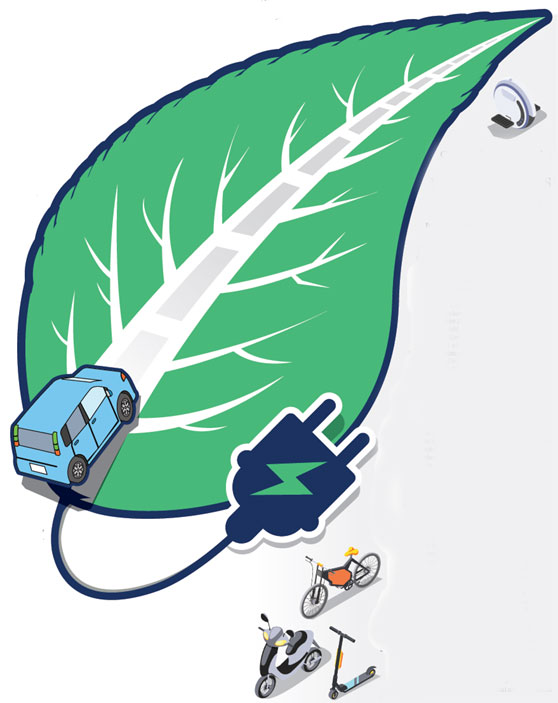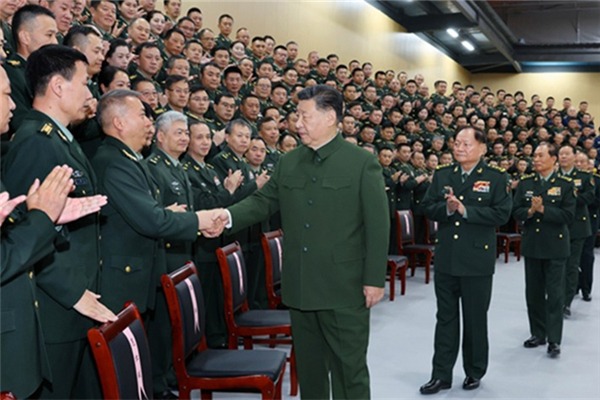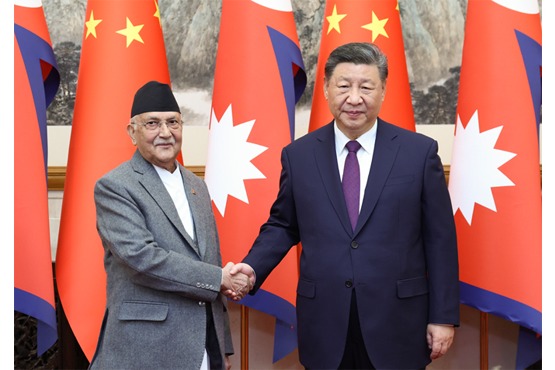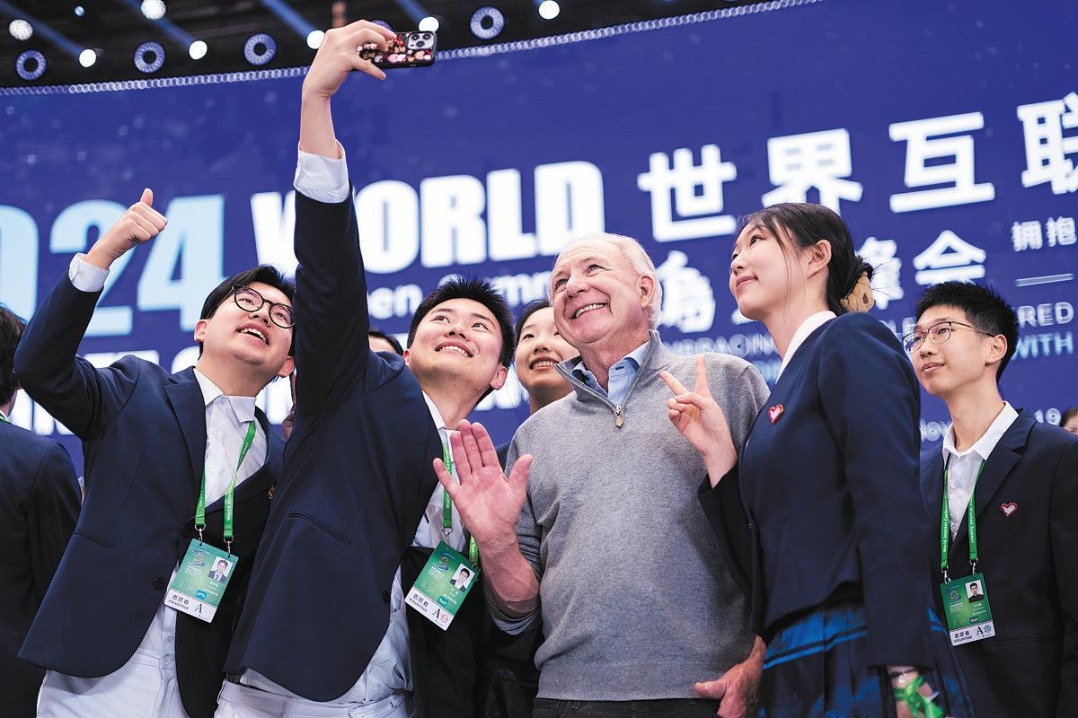In the green fast lane

Hong Kong is staying the course in accelerating the use of public and private electric vehicles to achieve its carbon neutrality goal before 2050. Liu Yifan reports from Hong Kong.

Hong Kong is ramping up efforts to build a low-carbon transportation network by going all out to replace fuel-propelled vehicles with electric alternatives, which the city sees as critical to attaining its climate goals and making itself a more livable place.
Financial Secretary Paul Chan Mo-po announced an ambitious step in the 2023-24 budget earlier this year, offering 100 percent loan guarantees of HK$6.4 billion ($820 million) for taxi drivers to encourage them to switch to battery-electric vehicles.
The latest measure is part of the special administrative region's bid to achieve zero vehicular emissions and carbon neutrality. In 2021, the SAR government successively unveiled the Hong Kong Roadmap on Popularization of Electric Vehicles, Clean Air Plan for Hong Kong 2035, and Hong Kong's Climate Action Plan 2050, covering policy directions and future targets in various areas to promote the adoption of new energy transport technologies.
"Currently, carbon emissions from transportation account for about 20 percent of the city's total emissions," said Secretary for Environment and Ecology Tse Chin-wan. "To tie in with the target of achieving carbon neutrality in Hong Kong before 2050, developing new energy transport is an integral component in realizing our targets in reducing carbon emissions."
The government's green transportation campaign has secured the backing of electric-vehicle manufacturers.
Ouyang Xiaocheng, Asia-Pacific sales director at Shenzhen-based electric-vehicle maker BYD, said Hong Kong's string of initiatives has brought "unprecedented opportunities" to the market, as evidenced by the surging demand for new energy cars. The carmaker is participating in the government's push to introduce 3,000 electric taxis to Hong Kong by 2027.
The EV road map has set a target of halting new registrations of fuel-propelled private cars, including hybrid vehicles, by 2035 or earlier. Driven by various government policies, the percentage of electric private cars among all newly registered private cars had soared from 6.3 percent in 2019 to 52.8 percent last year.
But electric vehicles made up just 6.6 percent of the total number of vehicles in the SAR as of June, according to the Environmental Protection Department. This shows there is plenty of room for growth in the local new energy vehicle market, said Ted Lau, managing director of automotive distributor Inchcape Greater China.
Boosting sales
The huge market potential has pushed electric automakers to scramble for a share. SAIC Maxus - a subsidiary of the Chinese mainland's largest domestic carmaker SAIC Motor by sales - has doubled the total sales target of its flagship seven-seat EV minivan MIFA in Hong Kong to 1,000 units by October.
Amanda Yan, general manager of SAIC Maxus' overseas department, said the company is also preparing to launch electric delivery vans and other multipurpose vehicles in the Hong Kong market soon. "Hong Kong's position as a global financial hub and trading center, as well as the government's drive to promote the adoption of new energy electric cars, gives us great confidence in further growing our sales in the city," she said.
Other automakers, including BYD and Japan's Nissan Motors, also aim to roll out new EV models in Hong Kong.
"The SAR government's push to develop the new energy industry is firm and strong. Its policies have not only strengthened the public's acceptance of new energy passenger vehicles, but also accelerated new energy transformation in the public transportation sector," said Ouyang.
The latest testament to the advance in greener public transport is the launch of electric public light buses. The government has earmarked HK$80 million for a pilot program, subsidizing the operation of 40 electric public light buses and charging facilities. Hong Kong-based Shun Hing New Energy recently unveiled its HK$2 million Moonca model - the city's first electric-powered light bus - saying the minibus will hit the road later this year.
Hong Kong's public light buses, with 16 to 19 seats each, carry more than 1 million passengers daily, complementing larger buses and subway trains. At present, the city has about 4,349 minibuses. They include 3,352 green minibuses which have set routes and service hours, and fares supervised by the government; as well as 997 red public light buses whose routes and service hours are flexible.
With the help of a high-efficiency lithium-titanate battery, the 19-seater Moonca takes about 18 minutes to charge from 10 percent to 90 percent of its battery capacity, and can travel about 50 kilometers for every eight to 10 minutes of charging time, according to the operator.
"We hope to break into the minibus market as minibuses will all be converted into electric vehicles sooner or later. This is the prevailing trend," said Gary Ng Fuk-keung, managing director of Shun Hing New Energy.
Hong Kong also plans to put some 700 electric buses on the roads, as outlined by Chief Executive John Lee Ka-chiu in his maiden Policy Address last year.
Industry experts are optimistic about the SAR's electric-vehicle development prospects although some say there are still hurdles to be overcome. The biggest concern is insufficient EV chargers to be installed. By June, there were nearly 60,000 electric vehicles in the city, with only 6,142 chargers for public use. They include 3,596 medium-speed chargers and 1,022 fast chargers, according to the Environmental Protection Department.
"As for infrastructure development, Hong Kong's charging facilities are far from adequate. This is a major factor in commuters' decision on whether or not to use electric vehicles," explained Ouyang.
Chan Siu-hung, adjunct professor of the Department of Mechanical Engineering at the City University of Hong Kong, said it's not enough to rely on economic incentives alone if Hong Kong is to promote the use of new energy vehicles. It's more important to improve supporting infrastructure and make EV charging more convenient for residents.
Further measures should also be taken to facilitate the use of new energy products, said Ouyang. "There are challenges in promoting such products in the local market. We hope to streamline business processing procedures and offer online services, allowing easier market access for new products, as well as registration of new vehicles."
- Memorial commemorating heroic WWII rescue unveiled in China
- Intl forum sheds light on transdisciplinary higher education
- China completes field sampling tasks for national soil census
- Guangzhou plans to regulate the total number of electric bicycles
- Green Grows the Future
- 'Understanding the Chinese Nation' seminar explores unity in diversity and shared development





































